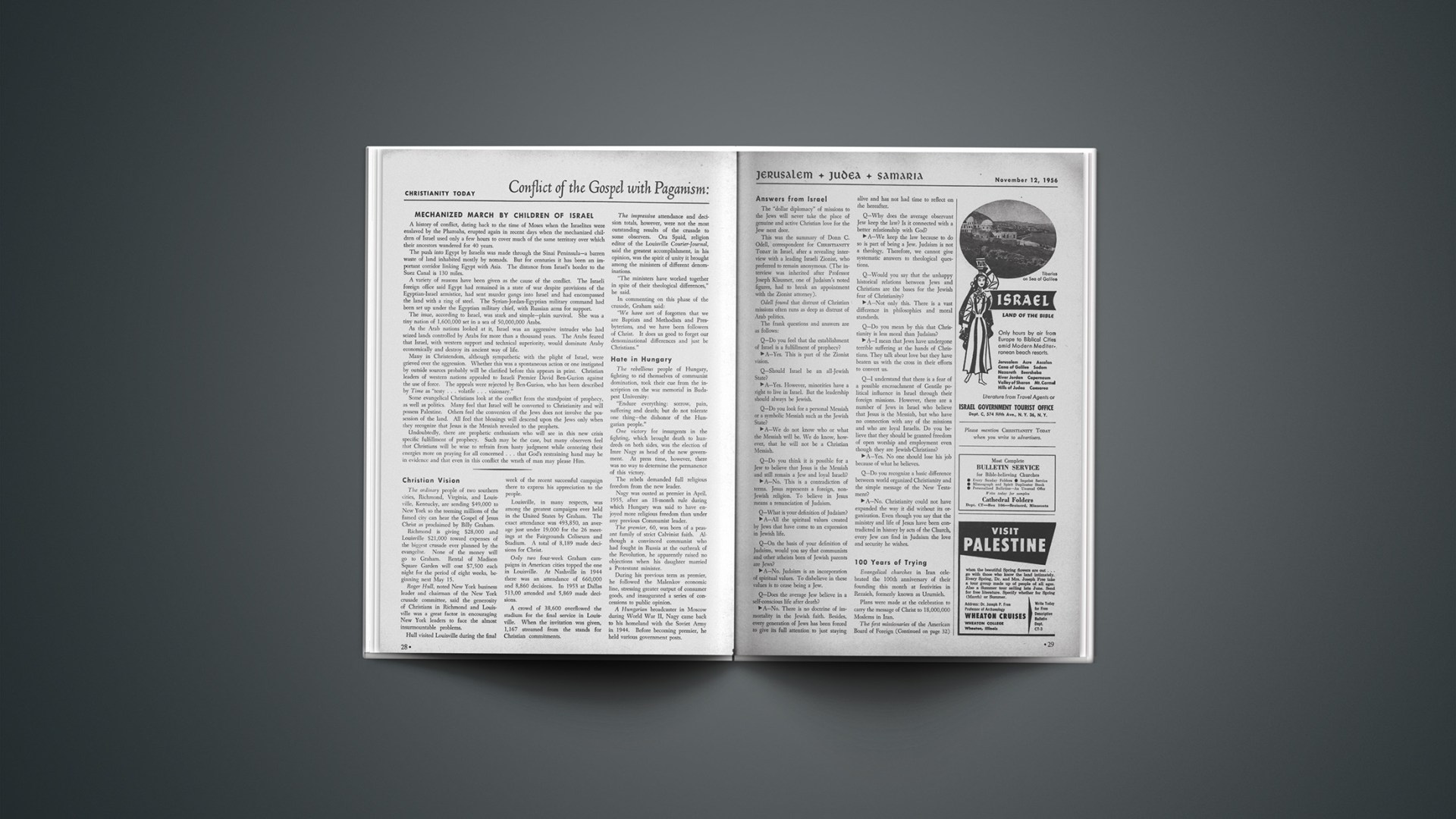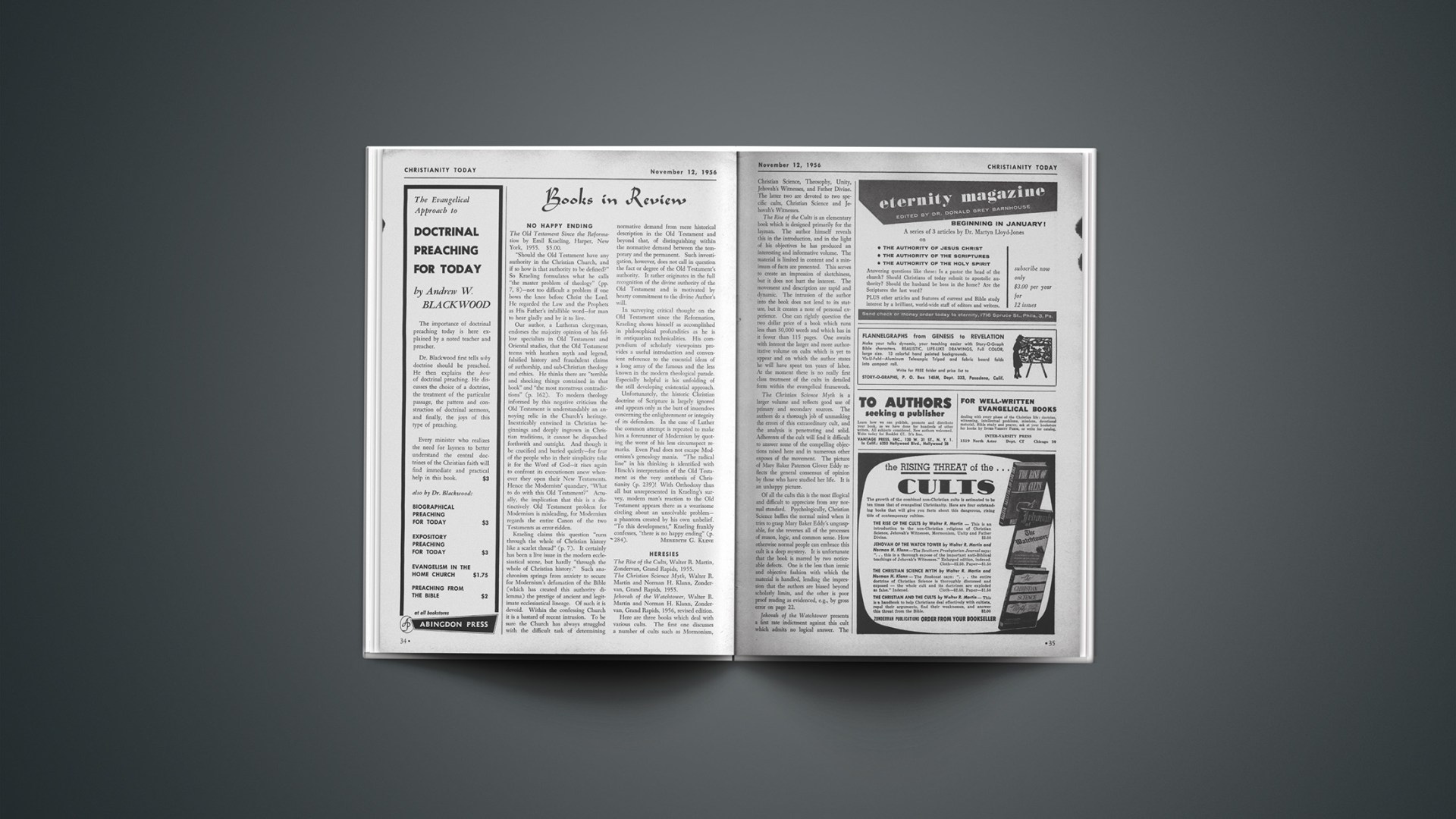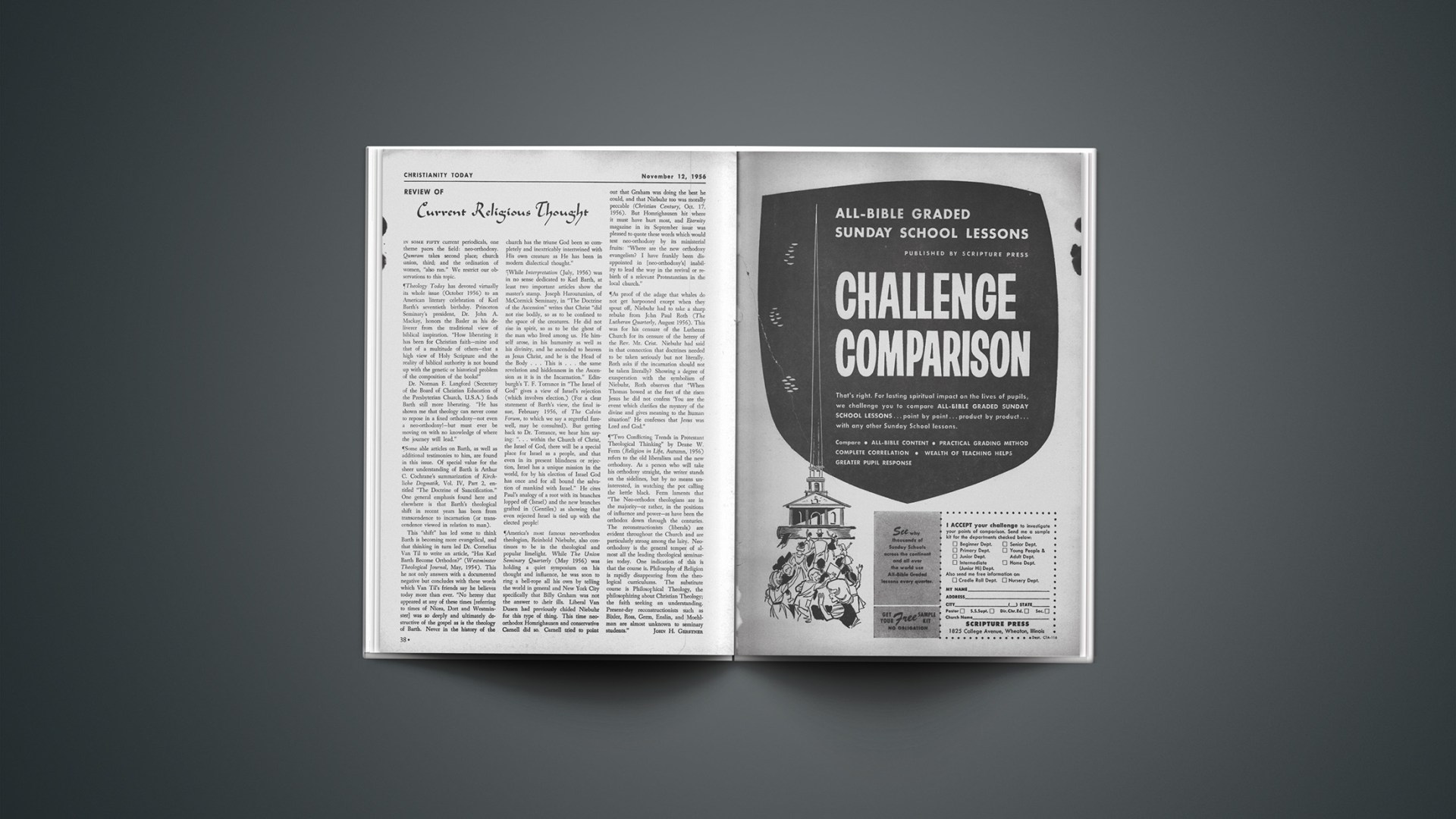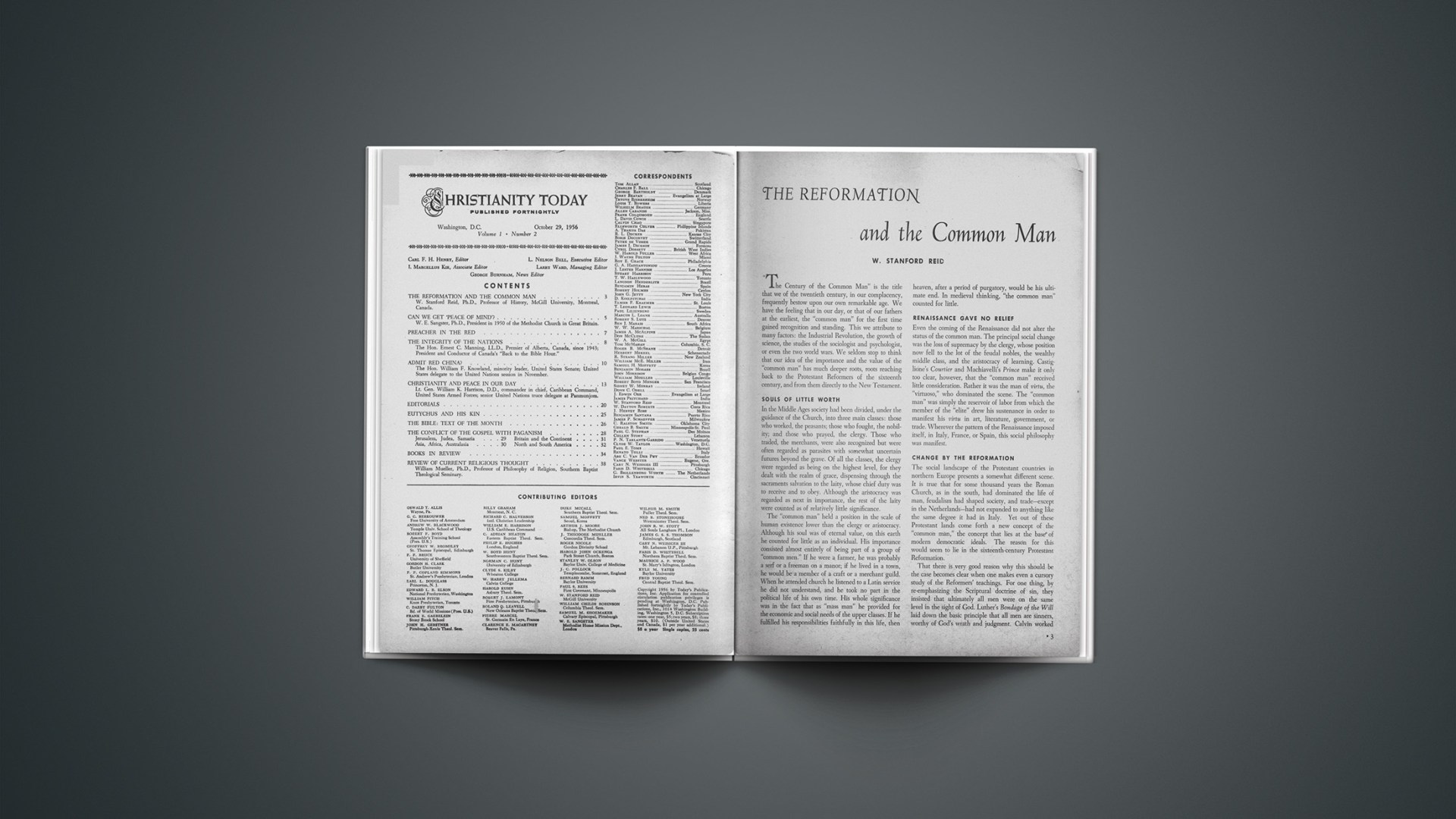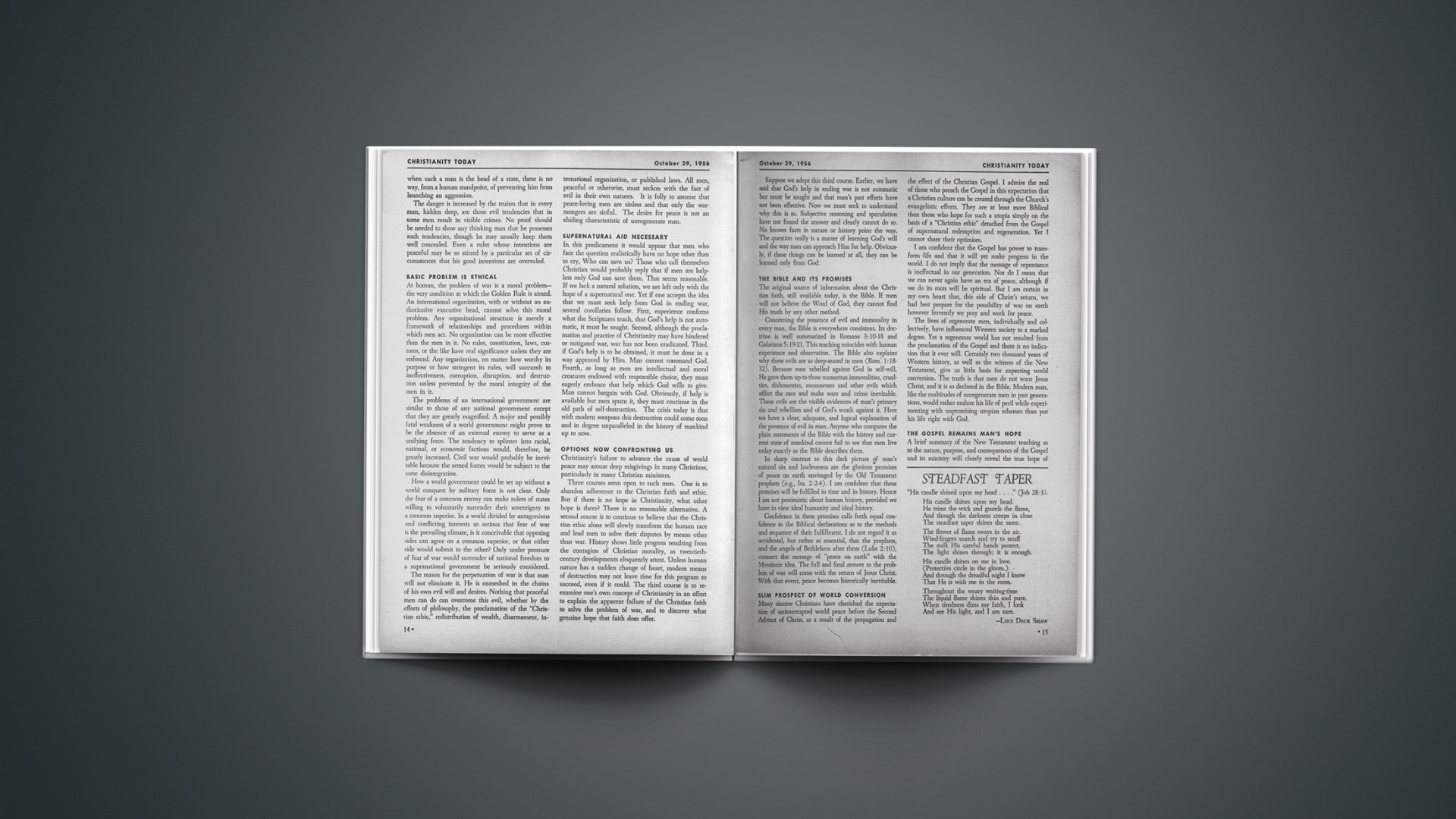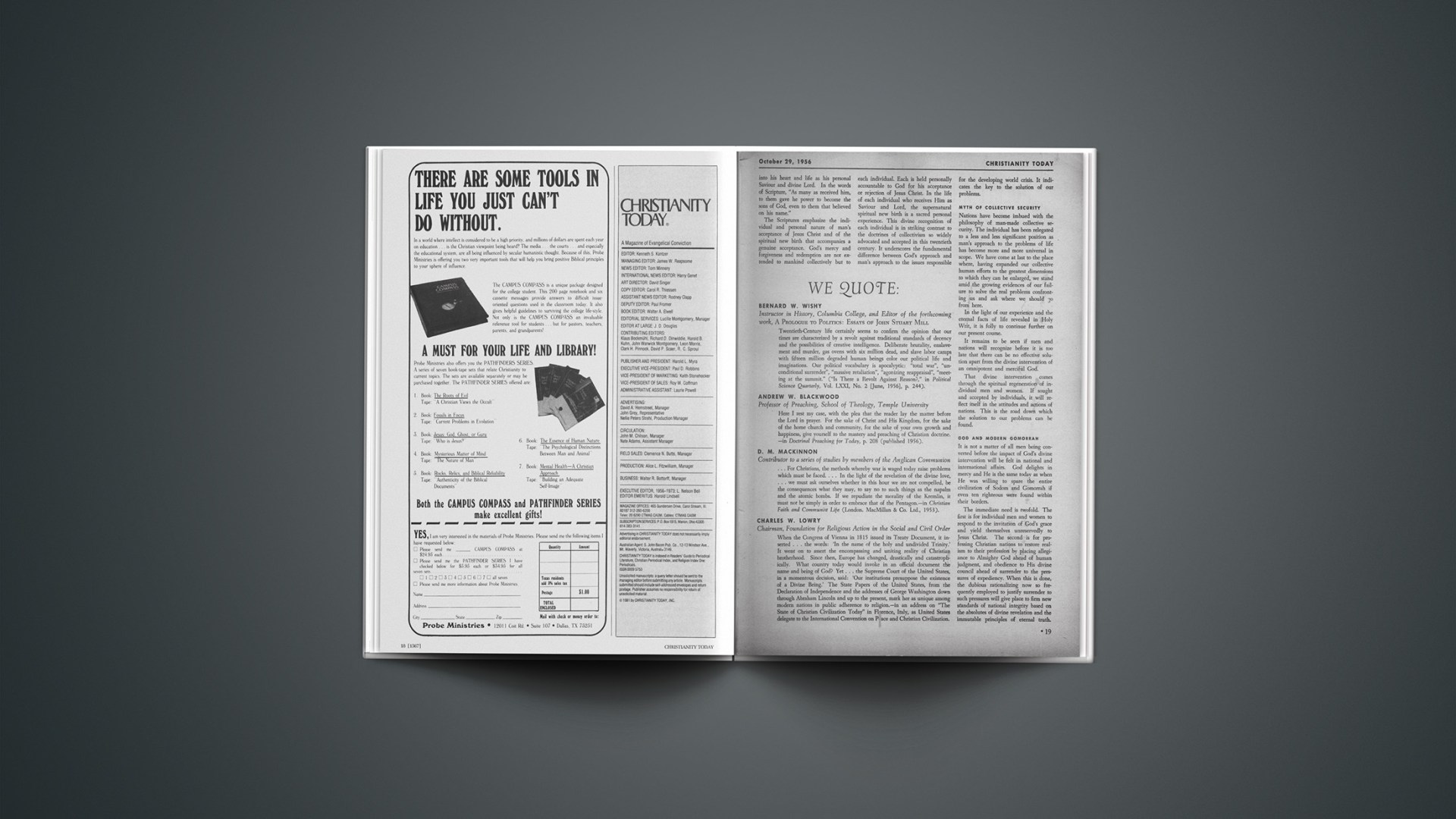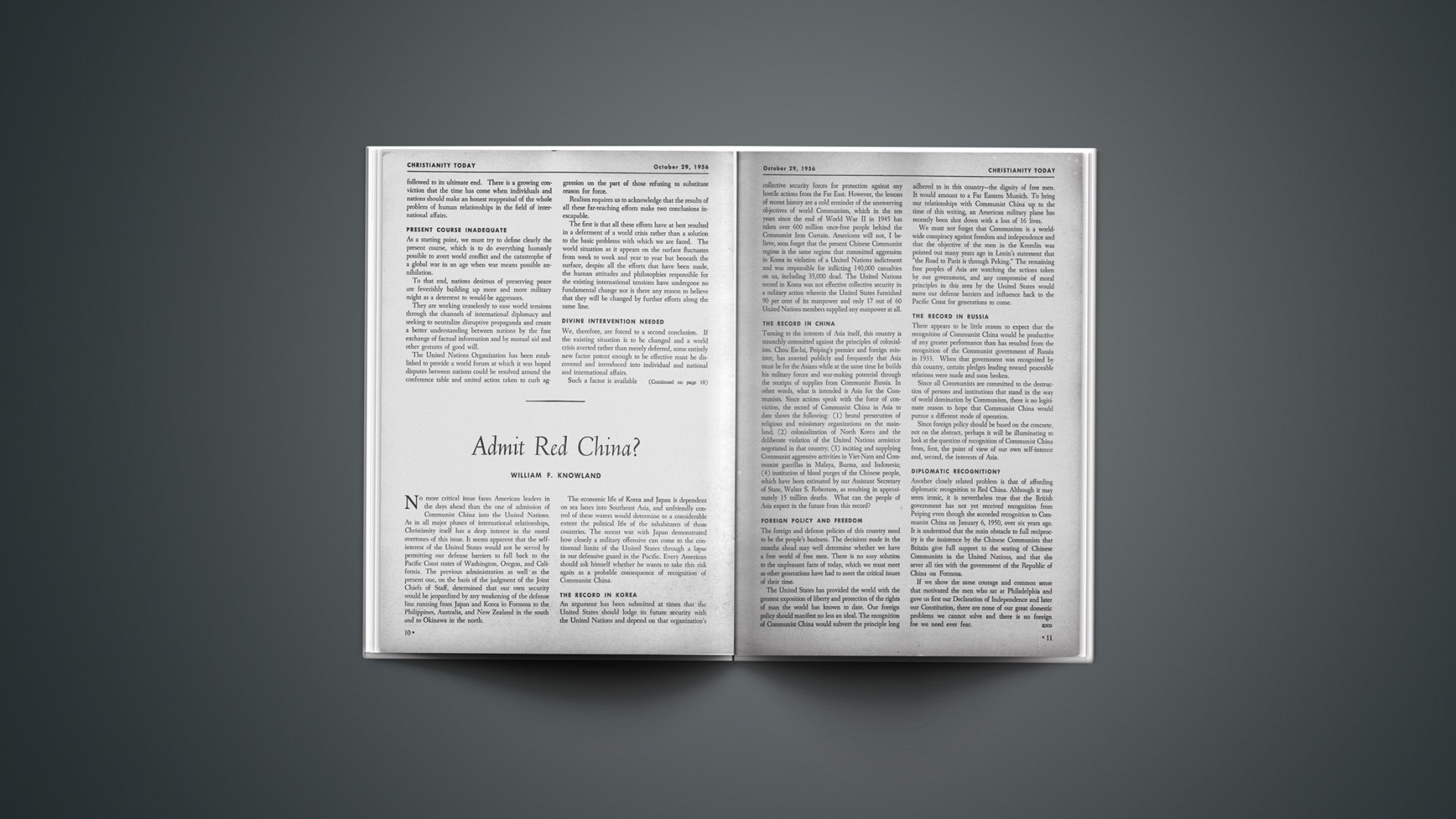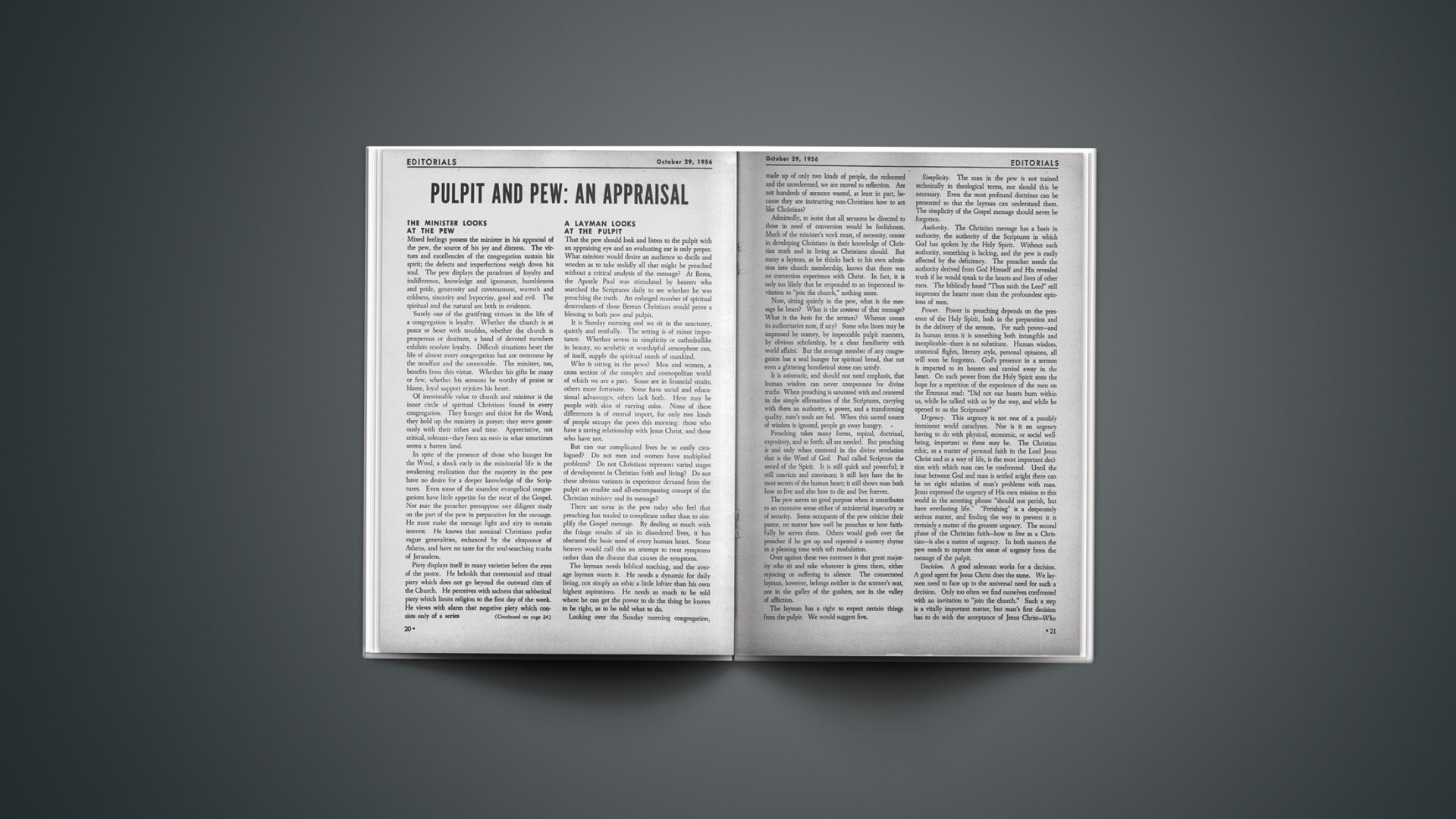Mechanized March By Children Of Israel
A history of conflict, dating back to the time of Moses when the Israelites were enslaved by the Pharoahs, erupted again in recent days when the mechanized children of Israel used only a few hours to cover much of the same territory over which their ancestors wandered for 40 years.
The push into Egypt by Israelis was made through the Sinai Peninsula—a barren waste of land inhabited mostly by nomads. But for centuries it has been an important corridor linking Egypt with Asia. The distance from Israel’s border to the Suez Canal is 130 miles.
A variety of reasons have been given as the cause of the conflict. The Israeli foreign office said Egypt had remained in a state of war despite provisions of the Egyptian-Israel armistice, had sent murder gangs into Israel and had encompassed the land with a ring of steel. The Syrian-Jordan-Egyptian military command had been set up under the Egyptian military chief, with Russian arms for support.
The issue, according to Israel, was stark and simple—plain survival. She was a tiny nation of 1,600,000 set in a sea of 50,000,000 Arabs.
As the Arab nations looked at it, Israel was an aggressive intruder who had seized lands controlled by Arabs for more than a thousand years. The Arabs feared that Israel, with western support and technical superiority, would dominate Araby economically and destroy its ancient way of life.
Many in Christendom, although sympathetic with the plight of Israel, were grieved over the aggression. Whether this was a spontaneous action or one instigated by outside sources probably will be clarified before this appears in print. Christian leaders of western nations appealed to Israeli Premier David Ben-Gurion against the use of force. The appeals were rejected by Ben-Gurion, who has been described by Time as “testy … volatile … visionary.”
Some evangelical Christians look at the conflict from the standpoint of prophecy, as well as politics. Many feel that Israel will be converted to Christianity and will possess Palestine. Others feel the conversion of the Jews does not involve the possession of the land. All feel that blessings will descend upon the Jews only when they recognize that Jesus is the Messiah revealed to the prophets.
Undoubtedly, there are prophetic enthusiasts who will see in this new crisis specific fulfillment of prophecy. Such may be the case, but many observers feel that Christians will be wise to refrain from hasty judgment while centering their energies more on praying for all concerned … that God’s restraining hand may be in evidence and that even in this conflict the wrath of man may please Him.
Christian Vision
The ordinary people of two southern cities, Richmond, Virginia, and Louisville, Kentucky, are sending $49,000 to New York so the teeming millions of the famed city can hear the Gospel of Jesus Christ as proclaimed by Billy Graham.
Richmond is giving $28,000 and Louisville $21,000 toward expenses of the biggest crusade ever planned by the evangelist. None of the money will go to Graham. Rental of Madison Square Garden will cost $7,500 each night for the period of eight weeks, beginning next May 15.
Roger Hull, noted New York business leader and chairman of the New York crusade committee, said the generosity of Christians in Richmond and Louisville was a great factor in encouraging New York leaders to face the almost insurmountable problems.
Hull visited Louisville during the final week of the recent successful campaign there to express his appreciation to the people.
Louisville, in many respects, was among the greatest campaigns ever held in the United States by Graham. The exact attendance was 493,850, an average just under 19,000 for the 26 meetings at the Fairgrounds Coliseum and Stadium. A total of 8,189 made decisions for Christ.
Only two four-week Graham campaigns in American cities topped the one in Louisville. At Nashville in 1944 there was an attendance of 660,000 and 8,860 decisions. In 1953 at Dallas 513,00 attended and 5,869 made decisions.
A crowd of 38,600 overflowed the stadium for the final service in Louisville. When the invitation was given, 1,167 streamed from the stands for Christian commitments.
The impressive attendance and decision totals, however, were not the most outstanding results of the crusade to some observers. Ora Spaid, religion editor of the Louisville Courier-Journal, said the greatest accomplishment, in his opinion, was the spirit of unity it brought among the ministers of different denominations.
“The ministers have worked together in spite of their theological differences,” he said.
In commenting on this phase of the crusade, Graham said:
“We have sort of forgotten that we are Baptists and Methodists and Presbyterians, and we have been followers of Christ. It does us good to forget our denominational differences and just be Christians.”
Hate In Hungary
The rebellious people of Hungary, fighting to rid themselves of communist domination, took their cue from the inscription on the war memorial in Budapest University:
“Endure everything: sorrow, pain, suffering and death; but do not tolerate one thing—the dishonor of the Hungarian people.”
One victory for insurgents in the fighting, which brought death to hundreds on both sides, was the election of Imre Nagy as head of the new government. At press time, however, there was no way to determine the permanence of this victory.
The rebels demanded full religious freedom from the new leader.
Nagy was ousted as premier in April, 1955, after an 18-month rule during which Hungary was said to have enjoyed more religious freedom than under any previous Communist leader.
The premier, 60, was born of a peasant family of strict Calvinist faith. Although a convinced communist who had fought in Russia at the outbreak of the Revolution, he apparently raised no objections when his daughter married a Protestant minister.
During his previous term as premier, he followed the Malenkov economic line, stressing greater output of consumer goods, and inaugurated a series of concessions to public opinion.
A Hungarian broadcaster in Moscow during World War II, Nagy came back to his homeland with the Soviet Army in 1944. Before becoming premier, he held various government posts.
Jerusalem + Judea + Samaria
Answers From Israel
The “dollar diplomacy” of missions to the Jews will never take the place of genuine and active Christian love for the Jew next door.
This was the summary of Donn C. Odell, correspondent for CHRISTIANITY TODAY in Israel, after a revealing interview with a leading Israeli Zionist, who preferred to remain anonymous. (The interview was inherited after Professor Joseph Klausner, one of Judaism’s noted figures, had to break an appointment with the Zionist attorney).
Odell found that distrust of Christian missions often runs as deep as distrust of Arab politics.
The frank questions and answers are as follows:
Q—Do you feel that the establishment of Israel is a fulfillment of prophecy?
A—Yes. This is part of the Zionist vision.
Q—Should Israel be an all-Jewish State?
A—Yes. However, minorities have a right to live in Israel. But the leadership should always be Jewish.
Q—Do you look for a personal Messiah or a symbolic Messiah such as the Jewish State?
A—We do not know who or what the Messiah will be. We do know, however, that he will not be a Christian Messiah.
Q—Do you think it is possible for a Jew to believe that Jesus is the Messiah and still remain a Jew and loyal Israeli?
A—No. This is a contradiction of terms. Jesus represents a foreign, non-Jewish religion. To believe in Jesus means a renunciation of Judaism.
Q—What is your definition of Judaism?
A—All the spiritual values created by Jews that have come to an expression in Jewish life.
Q—On the basis of your definition of Judaism, would you say that communists and other atheists born of Jewish parents are Jews?
A—No. Judaism is an incorporation of spiritual values. To disbelieve in these values is to cease being a Jew.
Q—Does the average Jew believe in a self-conscious life after death?
A—No. There is no doctrine of immortality in the Jewish faith. Besides, every generation of Jews has been forced to give its full attention to just staying alive and has not had time to reflect on the hereafter.
Q—Why does the average observant Jew keep the law? Is it connected with a better relationship with God?
A—We keep the law because to do so is part of being a Jew. Judaism is not a theology. Therefore, we cannot give systematic answers to theological questions.
Q—Would you say that the unhappy historical relations between Jews and Christians are the bases for the Jewish fear of Christianity?
A—Not only this. There is a vast difference in philosophies and moral standards.
Q—Do you mean by this that Christianity is less moral than Judaism?
A—I mean that Jews have undergone terrible suffering at the hands of Christians. They talk about love but they have beaten us with the cross in their efforts to convert us.
Q—I understand that there is a fear of a possible encroachment of Gentile political influence in Israel through their foreign missions. However, there are a number of Jews in Israel who believe that Jesus is the Messiah, but who have no connection with any of the missions and who are loyal Israelis. Do you believe that they should be granted freedom of open worship and employment even though they are Jewish-Christians?
A—Yes. No one should lose his job because of what he believes.
Q—Do you recognize a basic difference between world organized Christianity and the simple message of the New Testament?
A—No. Christianity could not have expanded the way it did without its organization. Even though you say that the ministry and life of Jesus have been contradicted in history by acts of the Church, every Jew can find in Judaism the love and security he wishes.
100 Years Of Trying
Evangelical churches in Iran celebrated the 100th anniversary of their founding this month at festivities in Rezaieh, formerly known as Urumieh.
Plans were made at the celebration to carry the message of Christ to 18,000,000 Moslems in Iran.
The first missionaries of the American Board of Foreign Missions arrived in Persia in 1834. In 1835 they began to work among the Nestorians (now usually called Assyrians), who lived near the borders of Turkey and Russia. Purpose of the missionaries was not to form a Protestant denomination, but rather to revive the dying Syriac-speaking Nestorian Church and enable it “through the grace of God to exert a commanding influence in the spiritual regeneration of Asia.”
The Bible was translated into modern Syriac. Books were printed and schools opened. There were schools for the clergy as well as for boys and girls. Christians and Moslems received medical attention. Earnest prayers for revival were offered.
After years of waiting and working, the revival came. Hundreds of Assyrians were converted and became witnesses for Christ.
The evangelical Christians gradually united for fellowship and, in 1854, began to take communion together. Ministers were former Nestorian priests who had accepted the evangelical teachings.
Prior to World War I, the Evangelical Church in Urumieh numbered more than 3,000. After the war the Assyrians scattered, leaving about 1,000 members there. They are now part of the Evangelical Church of Iran, established in all the larger cities.
Less than 100 Protestant foreign missionaries are active in Iran.
W.M.M.
Opportunity Unfolds
Bud Schaeffer, two-time Little All-American basketball player at Wheaton College and now serving in the Far East with Orient Crusades, is scoring with athletic evangelism as coach of the Nationalist China Olympic basketball team.
The team has been training for two months in Taipeh, Formosa, for the Olympic Games at Melbourne, Australia, in December.
Since practice began, Captain Tang and little Mr. Chu, a jet-pilot with 20 missions over Red China, have received Christ.
The opportunity unfolded like this:
In 1954 the Chinese Olympic committee needed a basketball coach for the Asian Games. The officials, on a visit to Manila, found one—Chuck Holsinger, Orient Crusades missionary. Holsinger led the team to runner-up honors.
This year, with the international games approaching, the committee again turned to Orient Crusades for assistance and found a man, Schaeffer. The Wheaton grad had attracted wide attention in the Far East as a player with the “Venture for Victory” basketball team—young Christian men who played hard and then gave testimonies at half-time. Thousands were reached at the games and school coaching clinics.
Schaeffer has requested the prayers of Christians around the world for the Olympic opportunity.
Concerning the decisions already made, he said:
“Holsinger planted, Schaeffer watered, but God gave the increase!”
Too Much Of Good Thing
“Perhaps we have had almost too much of a good thing” is an opinion being voiced in fast-growing New Zealand about “the great spate” of evangelistic activity by visiting Americans and Englishmen.
Remarked the Rt. Rev. A. K. Warren, Bishop of Christ Church:
“In the past year there have been several evangelical missions which have arrived in the country, unheralded and uninvited.
“It is not surprising that those who are anxious to get hold of people who have strayed, or who have never committed themselves to the Christian way of life, should frequently turn to these missions as a way of solving their problems. But I am convinced that we err greatly if we look upon mass evangelism as the one and only solution to our problem. Indeed, there is a great risk in doing so … mass evangelism requires long, careful and prayerful preparation.”
Condition Of Welcome
Political leaders in West Africa are keeping their eyes on the way churches and missionary societies adapt themselves to national progress.
“As long as you show that you are in sympathy with our aspirations, we shall welcome you missionaries in our country,” a Nigerian official told Dr. A. D. Helser of the African Challenge, leading religious publication. “When you cease to show that, we shall cease to welcome you.”
The British Colonial Office announced last month that the Gold Coast will receive full independence on March 6, 1957.
—W. H. F.
Country’s Fame
The South African rugby team was beaten badly in New Zealand recently because of its “failure to observe Sunday properly,” according to a Netherlands Reformed Church clergyman.
The Rev. J. H. Lange recalled that the team devoted the Sunday before leaving on the trip to having passport photos taken, being inoculated and making other arrangements.
“Would it not have been much better,” he said, “if these men, as envoys of a Christian land, had quietly visited some church on that Sunday?
“If our churchmen, statesmen and sportsmen continue to desecrate God’s day on the pretext of advancing our country’s fame, the day will come when we will have no fame left.”
Digest …
Dr. Ralph E. Dodge, 49, formerly of Ridgewood, N.J., elected Bishop of the Methodist Church for Central and Southern Africa.
Dr. Robert G. Cochrane, London, technical advisor of American Leprosy Missions, cited by the government of India for outstanding service in the field of leprosy treatment and control.
Prime Minister Jussein S. Suhrawardy of Pakistan refutes report by Peiping Radio that he said there was religious freedom in China.
Eight-member delegation of top Australian Anglican churchmen visiting China as guests of Chinese Episcopal Church. First representative group of religious leaders to visit China since communists took over in 1949.
Reorganization of National Christian Council of India, aimed at disassociating group from foreign influence, approved at meeting in Allahabad. Foreign missionary societies, not integrated with Indian churches, will be limited to associate memberships. Dependence on foreign funds to be reduced gradually, according to vote of delegates at triennial conference of the Council.
Prime Needs Of Christianity Cited
Four Protestant clergymen of as many denominations sat down in Oklahoma City to summarize the needs and faults of preachers.
The findings came out like this:
“More forceful presentation of hard-and-fast biblical rules with a ‘thus sayeth the Lord’ emphasis, instead of man’s opinion, is needed to meet modern world needs. People have heard the word of man. Now they want the Word of God, because they’ve tried everything else and it hasn’t worked.”
Among the faults pinpointed were:
Vague rambling in sermons with no clear-cut point—often done to please congregations instead of enlightening them.
Pretentious and highly-colored delivery, either with little or no feeling, or an ostentatious amount of it.
Increased cutting of sermon length to “make it easy on the congregation.”
“Toning down” of the spiritual message to “please people” or make the Word of God “flexible.”
Timidity in stressing the harder demands of religion in action.
Members of the congregations didn’t get off entirely free. “Greater consecration” was urged by the ministers.
Signers of the statement included a Baptist, Methodist, Presbyterian and Disciple.
Britain And The Continent
World’s Fair Plans
Wide-awake Protestants in Belgium, numbering only 75,000 in a population of 8,500,000, are making determined plans for God to have a choice spot in 1958 at the Brussels World Exhibition, which is expected to attract 25,000,000 visitors from 50 countries.
The small minority has commissioned construction of an aluminum brass church and hall in the center of the Exhibition. A series of 12 exhibits, showing various aspects of the life and work of the Protestant Church around the world, will be displayed. Total cost is expected to be about $100,000.
Exhibition officials have approved the church and hall plans. One official described them as “the best of all projects submitted until now.”
The church will be constructed so that it can be moved to a new location for continued use after the fair.
(The United States Congress has authorized $4,000,000 for an American exhibit).
A Man’s First Words
What is the message of a minister when he returns to a pulpit for the first time after being imprisoned in Hungary on a false charge of black market currency dealings?
An estimated 1,200 showed up at the 400-capacity church in Budapest recently to hear the words of freed Lutheran Bishop Lajos Ordass, a man who seemingly had lost everything.
This was the message:
“When everybody deserted me and I shook with fear, my Savior called me and took me in His strong arms. He led me through a burning flame and showed me the beginning of a new life.
“I knew then that if nothing is constant in this world, God is unchanged; and to Him, that which was sin yesterday remains sin today, and that which was holy yesterday remains holy today.”
Stott Visits America
The Rev. John R. W. Stott, evangelical rector of All Souls Church, London, and one of the contributing editors of CHRISTIANITY TODAY, will arrive this month for a four-month visit to the United States and Canada.
He will conduct a series of evangelistic missions for students at Yale, Harvard, Illinois and Michigan universities in the U.S. Students at Toronto and Montreal in Canada will hear him also.
The young Church of England clergyman is a Cambridge graduate with an outstanding academic record. To an exceptional degree, he combines gifts of Bible exposition, evangelistic preaching and church administration. His church in central London is packed to capacity twice each Sunday.
Money Plan Hit
The British Government’s new plan for premium bonds has come under fire from churches on grounds that it is a lottery.
Under the plan, people are invited to purchase bonds which will pay no normal or regular interest. A “draw” will be held from time to time and holders of the lucky-number bonds will receive a special bonus. No gamble is taken on the capital sum invested.
The Archbishop of Canterbury, Dr. Geoffrey Fisher, in his diocesan letter for November, describes the plan as “a cold, solitary, mechanical, uncompanionable, inhuman activity,” with “nothing to redeem” the element of chance.
Dr. Fisher said Christians deplore the ever-increasing pressure of irresponsible money-making. “I believe,” he said, “that the best course is to leave the whole thing alone—if you like, severely alone.”
Evangelical opinion, generally, backs Dr. Fisher.
The Christian remarked:
“Christians should have nothing to do with gambling in any form, not even when it is presented in the guise of patriotism.”
F.C.
Historic Church Rebuilt
The new Pilgrim Fathers Memorial Church in London, said to be the oldest Congregational Church in Britain, was dedicated recently by U.S. Ambassador Winthrop W. Aldrich.
Queen Elizabeth II sent a message saying the work performed by the church members “cannot fail to strengthen the bonds between Great Britain and America.”
The Pilgrim Fathers prayed in the church before sailing for America in 1620. It has been rebuilt three times since the original structure was built in 1616 by martyrs from the adjoining Clink Prison.
Minister Of State
Zoltan Tildy, Hungary’s new Minister of State, is a clergyman of the Reformed Church who was the country’s first postwar President.
Tildy was appointed by Premier Imre Nagy after the anti-Soviet armed revolution.
The new cabinet minister attended a Protestant school at Pappa and later went to Ireland, where he studied at Belfast Presbyterian College.
Elected President after World War II, he was under constant pressure from the communists.
Digest …
Dr. George Fielden MacLeod, founder of Ionia Community (laboratory of Christian living) and chaplain to the Queen in Scotland since 1954, elected moderator of General Assembly of Church of Scotland for 1957.
Among last words of Lasclo Rajk, former Hungarian communist leader executed during purge, were prayers to God for forgiveness, Radio Budapest reports.
Religious groups in Soviet Zone protest to East German authorities against intensive atheistic propaganda campaign said promoted among members of newly-formed East German Army.
Lutheran Church of Sweden appoints two new bishops—the Rev. Gert Borgenstierna, Bishop of Karlstad, and the Rev. Ivar Hylander, Bishop of Lulea.
Training intensified in Geneva for colporteurs (traveling evangelists of Bible societies) at John Knox House.
Church publications in West Germany total 492, with circulation of 16,906,402. Largest circulation in pre-Nazi Germany—10,300,000 … Alcoholism alarming in Sweden. Church says “one no longer dares to hope this is only a passing phenomenon.”
Moscow Radio complains that lack of cultural opportunities throughout Soviet Union making young people “turn to Church for consolation.”
A sect of Islam has initiated missions venture in Sweden aimed at winning converts … In Copenhagen, Roman Catholic has, for first time, been appointed principal of Danish primary school, in which religious instruction, by law, “must be in accordance with teachings of Evangelical Lutheran Church.”
Josef Cardinal Mindzenty set free by Hungarian insurgents after eight years as prisoner of communists.
CHRISTIANITY TODAYis a subscriber to Religious News Service and Evangelical Press Service.
Christian Labor Union
The Christian Labor Association, an independent union which includes prayer and Bible reading in all meetings, has won a foothold in western Minnesota against the giant AFL-CIO.
CLA’s highway-construction Local 78 defeated AFL-CIO engineers Local 49 in National Labor Relations Board elections among some 120 employees of two highway contractors.
AFL-CIO leaders were disturbed before the elections.
“We know how to whip a dual union,” one commented, “but how can you do it if they claim God is on their side?”
More Than An Anthem
Men for Missions, not content to sing an anthem for the five young missionaries who were killed by savages in Ecuador, will establish a base from which trained nationals can evangelize the unreached tribes.
In announcing the project, the laymen’s voice of the Oriental Missionary Society said the headquarters building will be located in Guayaquil, Ecuador.
Keeps On Keeping On
Dr. John S. Wilder, in his 50 years as pastor of Calvary Baptist Temple in Savannah, Georgia, has preached 6,128 sermons, made 141,138 sick calls, raised $1,110,759 for church purposes, performed 6,505 marriages and conducted 6,271 funerals.
In addition, he has led 5,908 meetings, written 5,403 published articles and served as president of the Georgia Baptist Association. He is continuing.
Fair Enough
The First Baptist Church of Little Rock, Arkansas, has offered to refund the money of any member who isn’t satisfied after tithing for three months.
Klansmen In Church
Ku Klux Klansmen, known mostly for angry cross burnings, have been making peaceful church visits lately around Mobile, Alabama.
About 50 of the Klansmen, hooded and robed but with faces unmasked, attended services at two Baptist churches. As they entered, the organists played “Onward Christian Soldiers.” After one service, they filed up the church aisle and left contributions.
Mobile Baptist Pastors Conference promptly adopted a resolution decrying “the presence or financial contributions” at worship services of any group “whose purpose in coming may be to glorify itself.”
Postcard Tracts
A new U.S. international postcard, which will carry a message first class to any part of the world for four cents, will feature the national motto, “In God We Trust.”
An eight-cent postage-paid reply card, carrying the same motto, can be returned free from anywhere.
They will be placed on sale November 16 in New York City.
Worth Quoting …
“It is heartening to see so many Americans supporting the faith which lies at the bedrock of our society.”—President Eisenhower.
“I believe the most patriotic thing a man can do is to give his life to God.”—Dr. Billy Graham.
“Deeper life conventions are a dime a dozen these days, but yet we do nothing bout crucified living.”—Dr. A. W. Tozer, Christian Missionary Alliance pastor in Chicago.
Digest …
“The highest fee ever expended for the outright seduction of youth” was $50,000 paid Elvis Presley for appearing on Ed Sullivan TV show, charged the Rev. William J. Shannon, Syracuse diocesan director
Dr. Geoffrey Fisher, Archbishop of Canterbury, to attend Jamestown (Virginia) Festival next April, celebrating 350th anniversary of first successful English colony in America.
Rep. Thomas J. Dodd (D.-Conn.) member of House Foreign Affairs Committee, urges President Eisenhower to insist on “positive guarantee” from Marshal Tito that full religious freedom be restored to Yugoslavia before further military and economic aid.
Country churches, because of population shifts, closing at rate of about 1,000 a year … Lutheran home for elderly people to be built in Sioux City, Iowa, at cost of $3,000,000 … Plans made for $20,000,000 project to re-create biblical Jerusalem, Bethlehem and Nazareth near San Diego, Calif. Announced by American Foundation for Preservation of Christian Heritage.
Liquor establishments outnumber churches better than four to three. FBI says 60 per cent of 2,945,216 arrests during first six months of ’56 related to alcohol.
Gideon Bibles soon to be available in waiting rooms of many Connecticut industrial plants. Said to be first Bible-in-industry movement in America.
Shipment of 52 heifers and three bulls, investment in peace, sent from Houston, Texas, to Russia by Heifer Project of New Windsor, Md.

